
The 2012 Cyberlearning Research Summit was a high-profile gathering in Washington DC on January 18, 2012, featuring TED-style talks on visions for the future of learning with emerging technologies. The Summit was supported by the National Science Foundation under grant #1132393.
Videos of Talks
The Cyberlearning Videos Channel has 28 videos of talks at the Summit. Each talk is about 10 minutes in length. Playlists for each talk set are also available. Talk sets are about 50 minutes to an hour in length.
In the style of the TED conferences, speakers aimed to:
- Discuss big ideas on at the intersection of emerging technology and research on learning;
- Articulate the “transformative potential” of a direction or approach;
- Communicate a sense of the broad research on this topic;
- Engage, inspire, and stimulate thinking in this new program area.
Reflections on the Summit
Graphic Illustrations
Graphic illustrations of Summit talks, drawn by Jim Nuttle. Available for use under Creative Commons Attribution-ShareAlike 3.0 License. Attribution information: SRI International, with support from NSF grant #1132393. Clicking on a graphic will open it in a separate tab at a larger size.
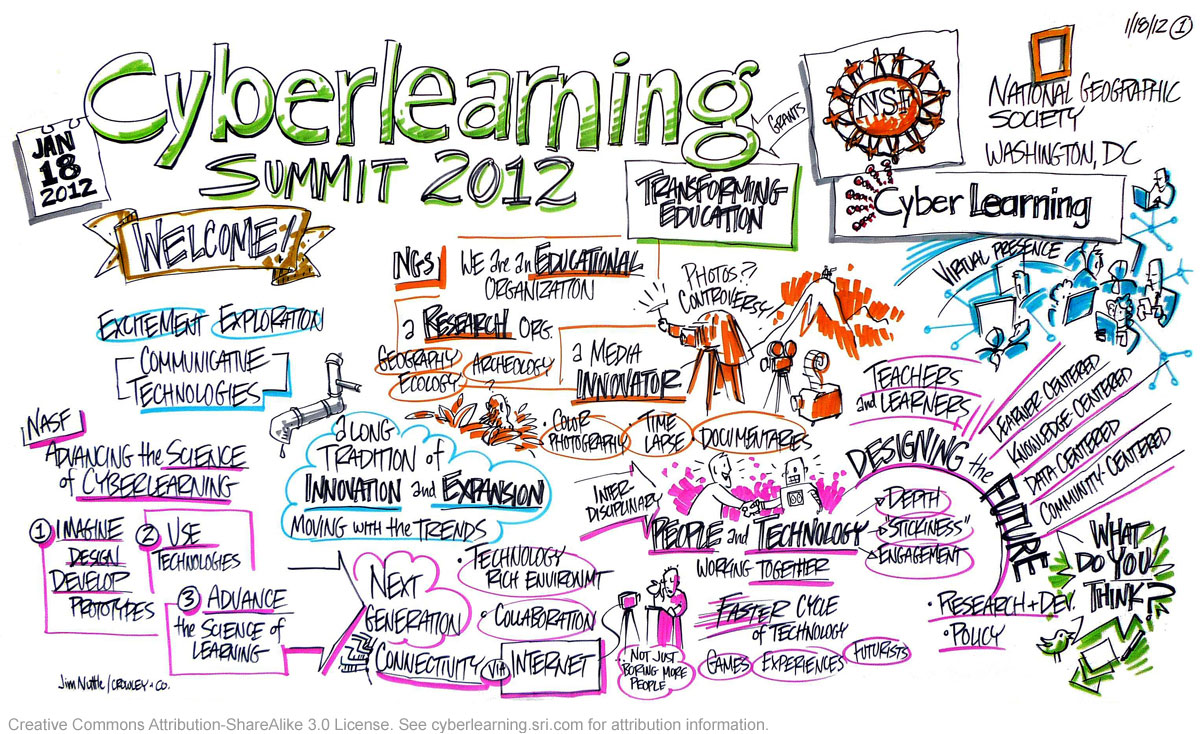 |
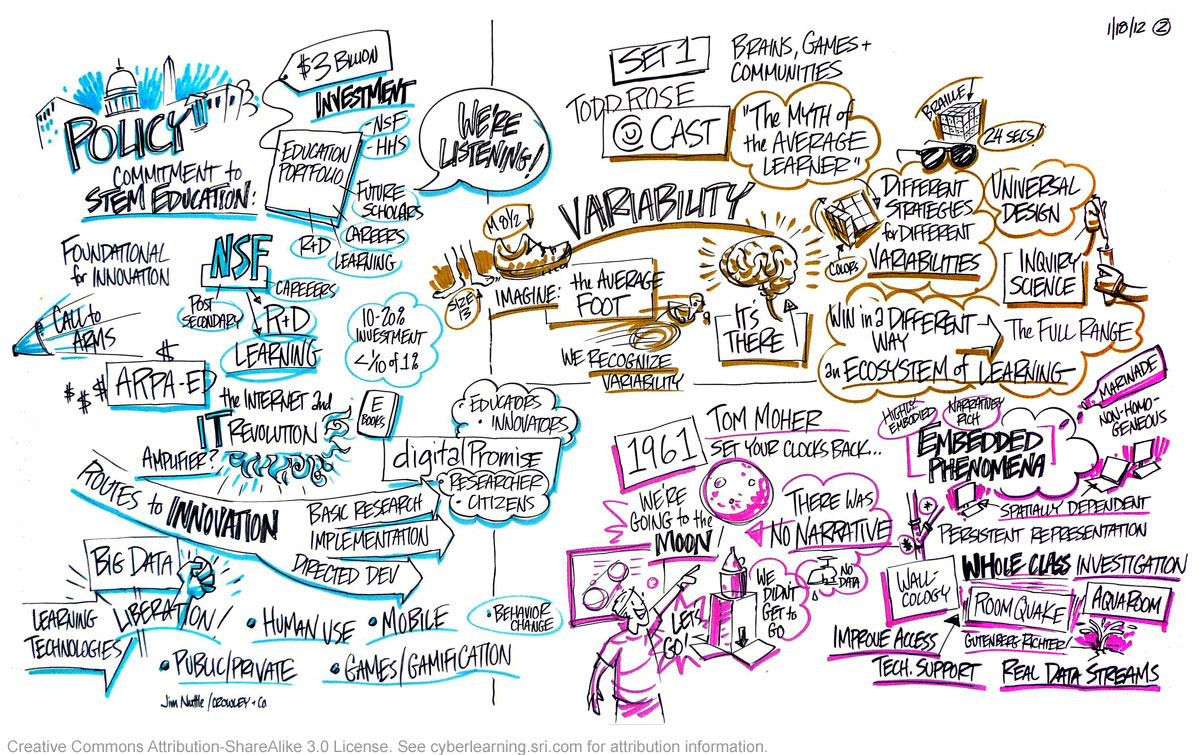 |
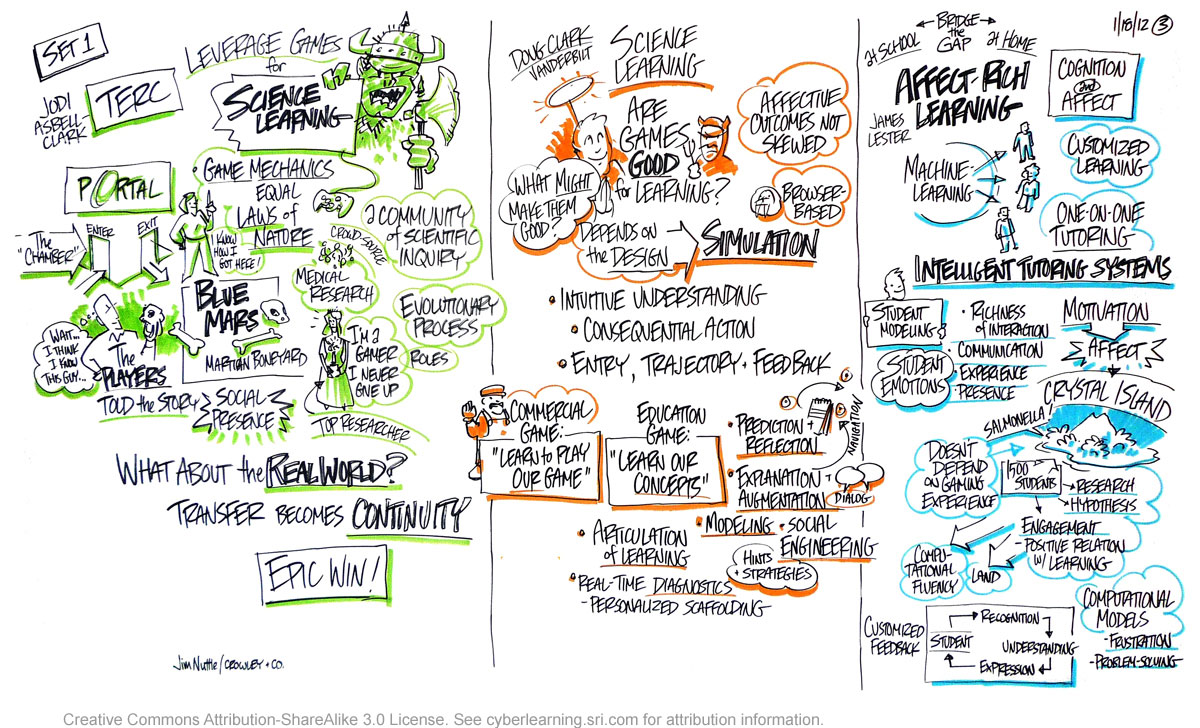 |
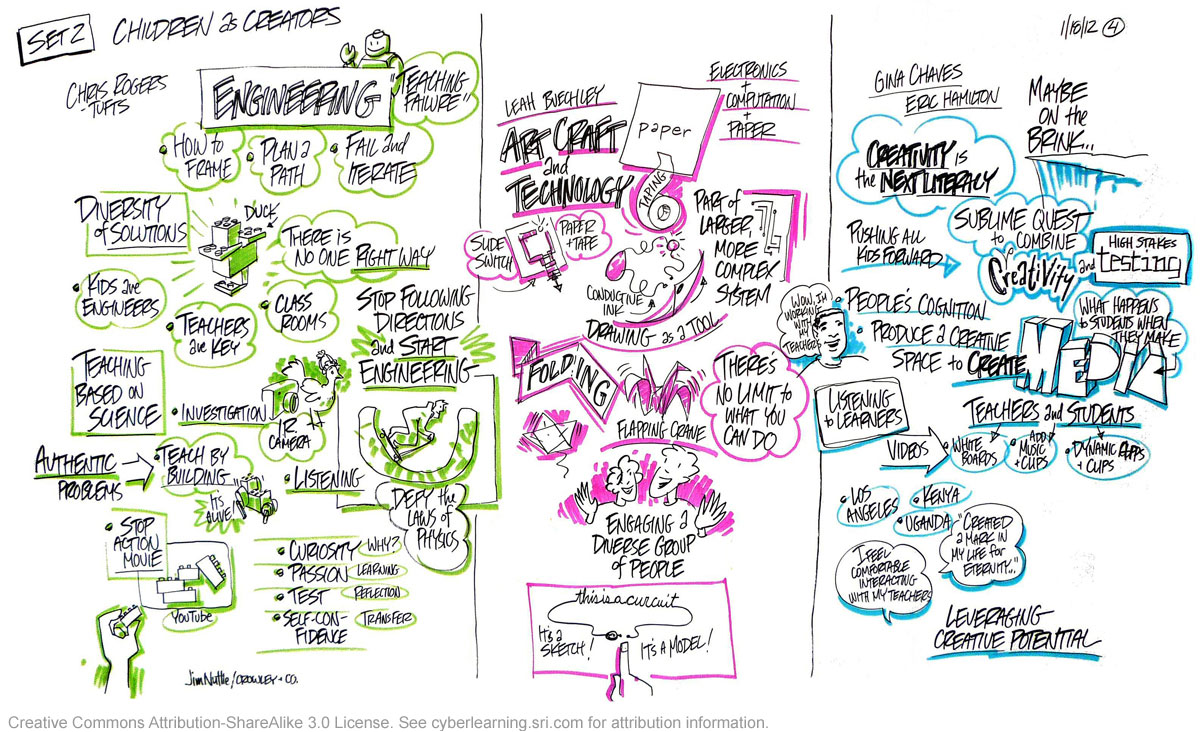 |
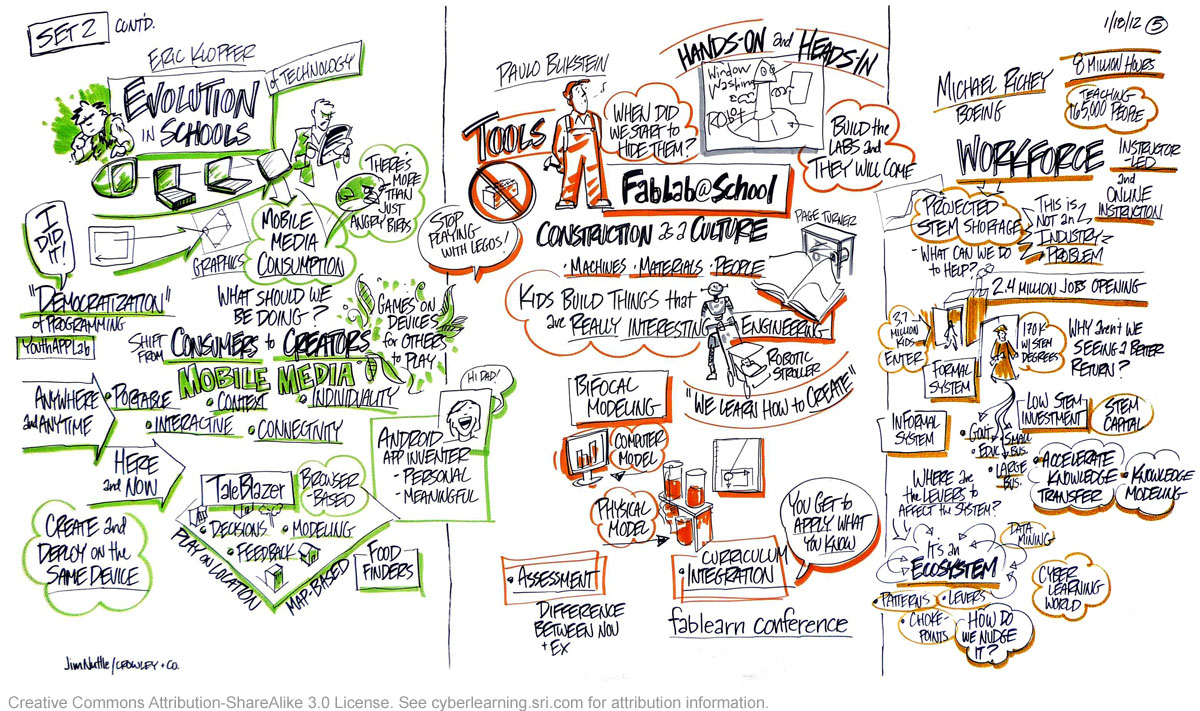 |
 |
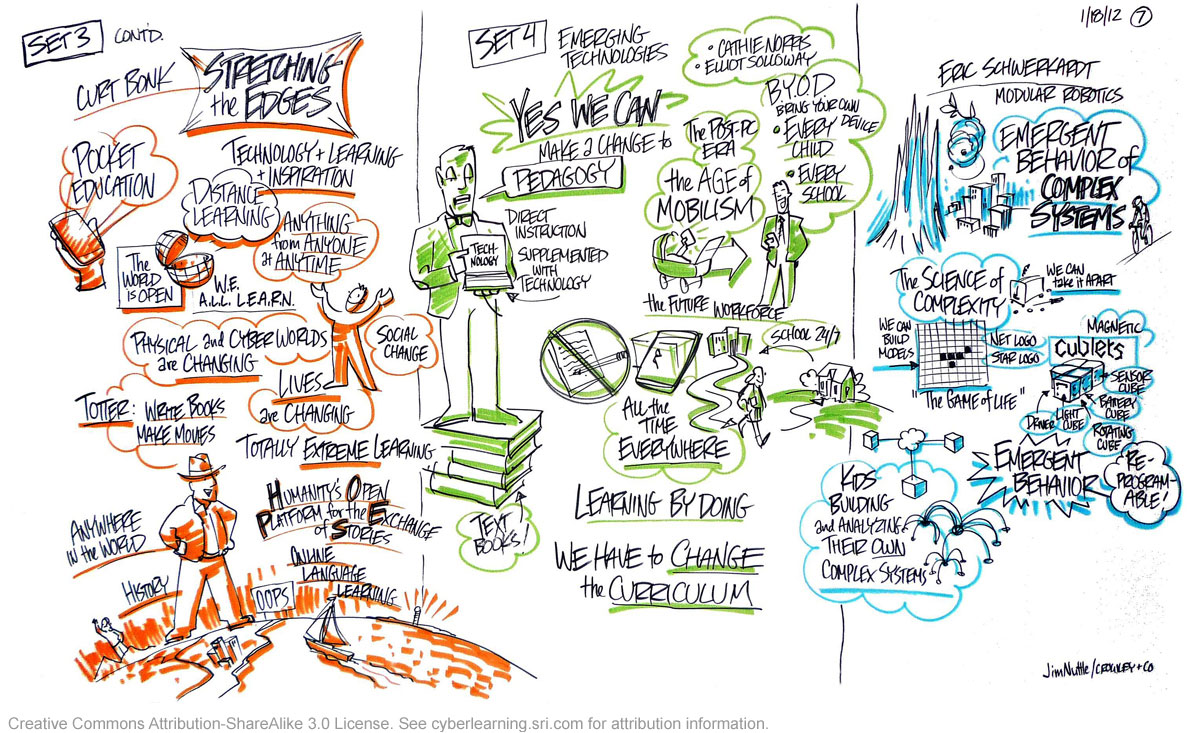 |
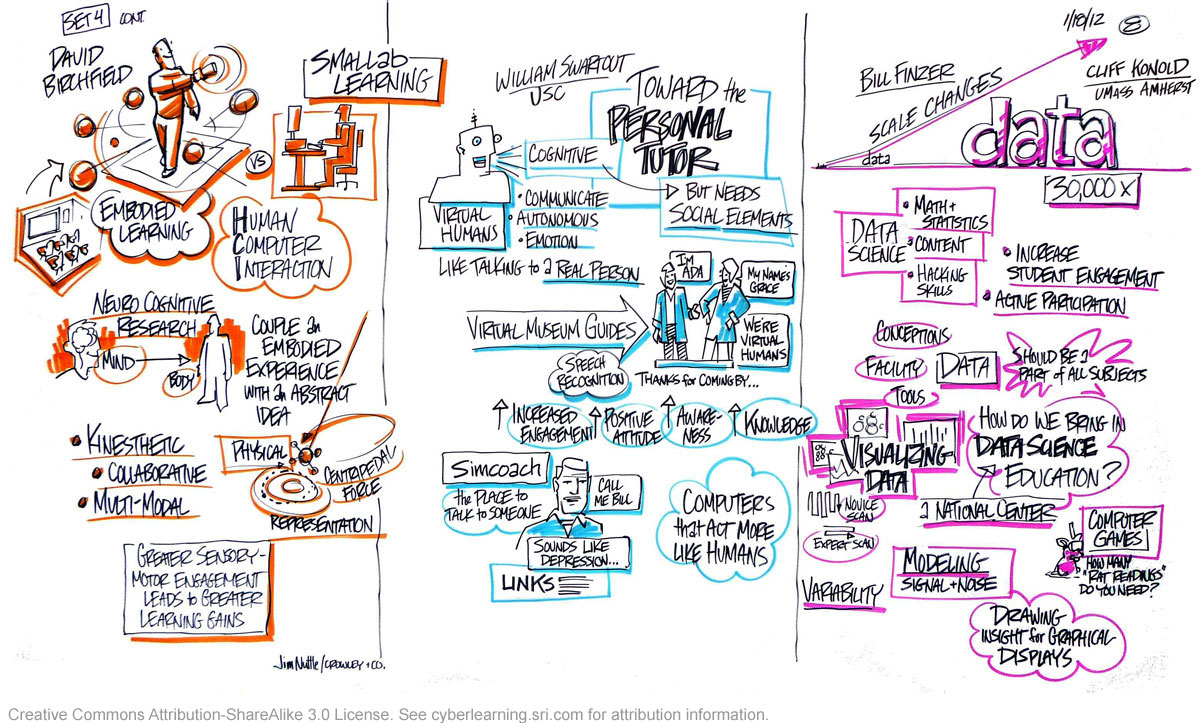 |
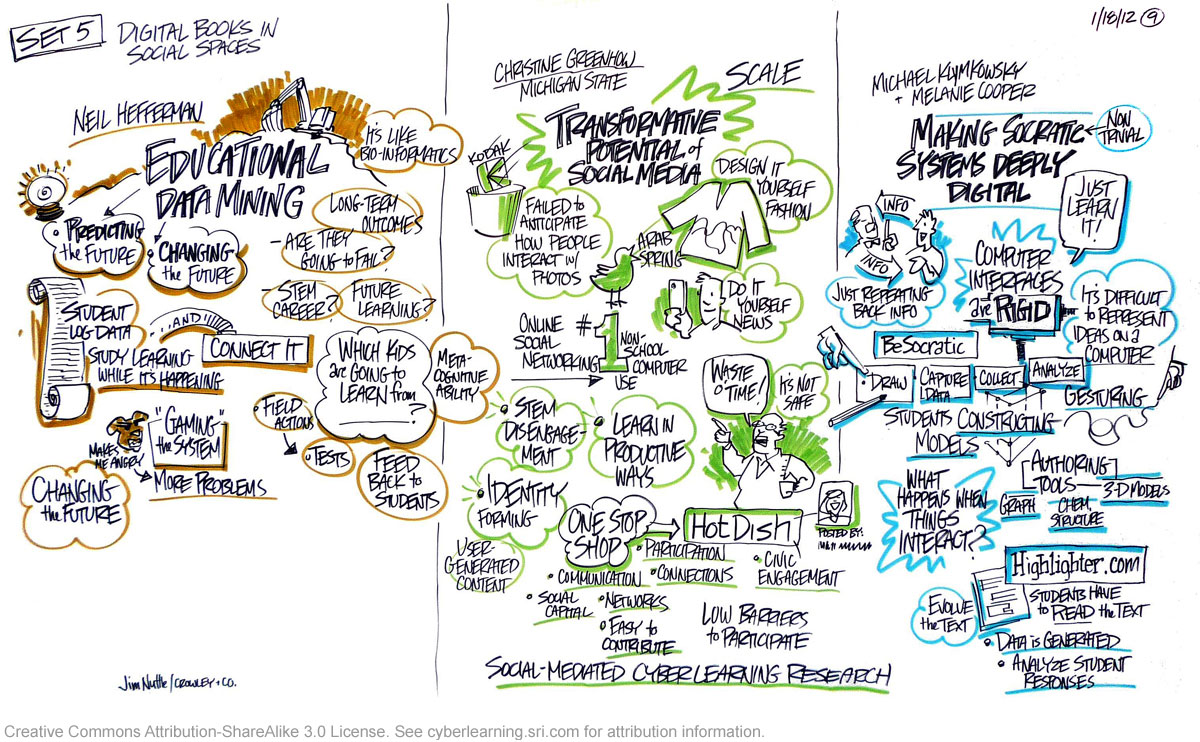 |
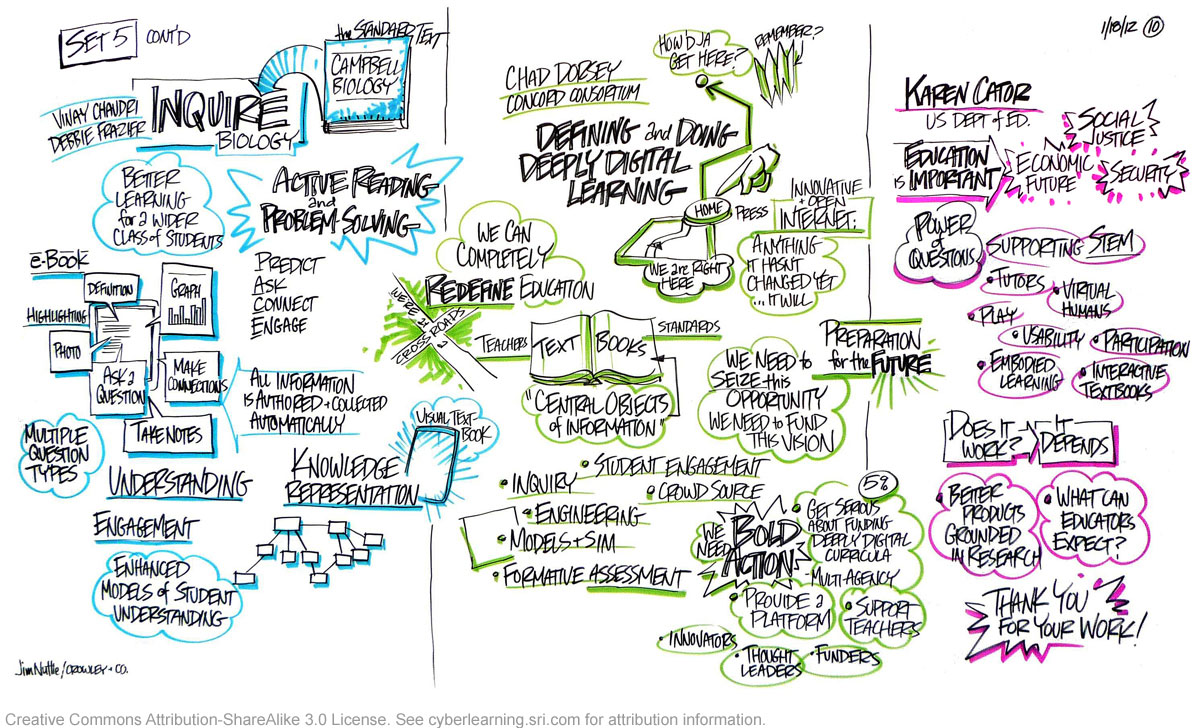 |
Topic Areas
Participants were invited to help write pages for cyberlearning topic areas. Our aim was to develop definitions strong enough to show the direction of the field but open enough to allow for innovation. Below are the topic pages submitted by the community.
- AI Applications in Education
- Citizen Science
- Computational Thinking
- Deeply Digital Texts
- Educational Data Mining
- Games and Virtual Worlds
- Mobile Learning
- Peer Production
- Simulations
- Social Media
- Technology Enabled Formative Assessment
- Virtual Communities for Learning
- Visualization
See also the Cyber Workforce Development Task Force Report.
Defining Cyberlearning
Existing definitions of cyberlearning are broad; for example, “learning that is mediated by networked computing and communications technologies” (NSF Task Force on Cyberlearning, 2008, p. 10). A related, more expansive definition of a vision is
Cyberlearning offers new learning and educational approaches via networked computing and communication technologies, and the possibility of redistributing learning experiences over time and space. Our scope incorporates the entire range of learning experiences over the course of a lifetime—not only formal education, not only in classes, but throughout the waking hours. (Bransford, Vye, Stevens et al., 2006)
Our understanding and starting point for the definitions of Cyberlearning topics include:
- A focus on the process of learning and the participation of learners
- Attentive to emerging forms and capabilities of technology for learning, while seeing learning as social and cultural and as something that people do together
- Oriented to the process of learning across the different settings of everyday life and learners’ needs to connect what they do in school, home, and community settings
- Concerned with systems that join learners, technologies, content, and context together in ways that democratize access to advanced STEM knowledge and accelerate learners’ progress along learning progressions toward deep disciplinary understandings.
References and Related Work
Bransford, J. D., Vye, N., Stevens, R., Kuhl, P., Schwarz, D., Bell, P., Meltzoff, A., Barron, B., Pea, R. D., Reeves, B., Roschelle, J. & Sabelli, N. (2006). Learning theories and education: Toward a decade of synergy. In Alexander, P. & Winne, P. (Eds.), Handbook of Education Psychology. Mahwah, N.J., Erlbaum: 209-244.
NSF Cyberinfrastructure Council (2007). Cyberinfrastructure Vision for 21st Century Discovery. Arlington, VA: NSF.
NSF Task Force on CyberLearning (2008). Fostering learning in the networked world: The cyberlearning opportunity and challenge. Washington, DC: NSF.
U.S Department of Education (2010). National Education Technology Plan 2010: Transforming American Education: Learning Powered by Technology. Washington DC: U.S Department of Education Office of Technology.
Program
9:00 am Welcoming Remarks
Danny Edelson, National Geographic Society
Janet Kolodner, National Science Foundation
Jeremy Roschelle, SRI International
Constance Steinkueler Squire, White House Office of Science and Technology Policy
9:30 am Talk Set 1: Learning Science Research: Brains, Games, and Communities
Todd Rose, CAST
Tom Moher, University of Illinois Chicago
Jodi Asbell-Clarke, TERC
Doug Clark, Vanderbilt University
James Lester, North Carolina State University
10:30 – 11:00 am Break: Coffee and snacks
11:00 am Talk Set 2: Children as Creators: Constructivism meets CyberLearning
Chris Rogers, Tufts University
Leah Buechley, MIT
Gina Chaves, Alliance Technology Math and Science High School & Eric Hamilton, Pepperdine University
Eric Klopfer, MIT
Paulo Blikstein, Stanford University
12:00 – 1:00pm Lunch Break – Box lunches
1:00 pm From a Linear Pipeline to a Complex Systems Model of STEM Workforce Preparation
Michael Richey, Boeing
1:15 pm Talk Set 3: Everyday Contexts for Cyberlearning, Beyond School
Jennifer Frazier, Exploratorium
David Kanter, New York Hall of Science
Matthew Easterday, Northwestern University
Curt Bonk, Indiana University
2:15 pm Talk Set 4: Emerging Technologies
Cathie Norris, University of North Texas & Elliot Soloway, University of Michigan
Eric Schweikardt, Modular Robotics
David Birchfield, Arizona State University
Wllliam Swartout, University of Southern California
Bill Finzer, KPC Technologies; Cliff Konold, UMass Amherst
3:15 – 3:45 pm Break: Drinks and snacks
3:45 pm Talk Set 5: Digital Books in Social Spaces with Educational Data Mining
Ryan Baker & Neil Heffernan, Worcester Polytechnic Institute
Christine Greenhow, Michigan State University
Michael Klymkowsky, University of Colorado at Boulder & Melanie Cooper, Clemson University
Vinay Chaudhri, SRI International & Debbie Frazier, Monta Vista High School
Chad Dorsey, Concord Consortium
4:45 pm Closing Reflections – Karen Cator, US Dept of Education
5:00-7:00 pm Reception
Hotel and Meeting Location
Meeting Location:
National Geographic Society
1145 17th Street Northwest (17th and M)
Washington D.C. 20036.
Conference Hotel:
The Hyatt Arlington
1325 Wilson Boulevard
Arlington, Virginia, USA 22209
Nearby Restaurants
See Yelp recommendations near the Hyatt and near the National Geographic Society
Organizers
SRI International, together with the Lawrence Hall of Science and the National Geographic Society, organized this Summit to advance the field’s shared vision of the future of learning, encompassing the systems, people, and technology dimensions mutually necessary for any scalable and lasting advances in STEM education.
Funding for the Summit was provided by the National Science Foundation (Grant #1132393). Additional support also provided by the Bill and Melinda Gates Foundation.
Summit Chairs
- Jeremy Roschelle, SRI International, Menlo Park
- Sherry Hsi, Lawrence Hall of Science, UC Berkeley
Advisory Committee, Reviewers, & Editors
- Chad Dorsey, Concord Consortium
- Daniel Edelson, National Geographic Society/National Geographic Education Foundation
- Judi Fusco, SRI International
- Chad Lane, University of Southern California
- Linda Polin, Pepperdine University
- Mimi Recker, Utah State University
- Patricia Schank, SRI International
